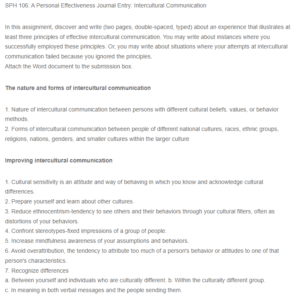A Personal Effectiveness Journal Entry-Intercultural Communication
When I got a job at a company in Dubai, my greatest worry was how I would adapt to the cultural practices in the country and manage culture shock because it was my first time working and living there. In preparation for the new experience, I read articles on critical cultural practices, values, and beliefs in the United Arab Emirates and acceptable codes of conduct to increase my cultural awareness. When I got to the country, I got a friendly reception from my coworkers, most expatriates. This made it easier for me to fit in. Given that most of our customers were from the United Arab Emirates. I exercised cultural sensitivity when attending to them to establish proper intercultural relations and maintain a good business relationship. I also applied cultural sensitivity when decision-making by embracing the company owner’s family involvement because the company was family-run. The United Arab Emirates culture places excellent worth on family. I also ensured that my dress code was in line with the acceptable dress code in the country to avoid disrespecting the Muslim culture.
I also successfully confronted my stereotypes about Muslims because I regularly interacted with them. I made some Muslim friends and spent time with them during my off days to learn more about their culture and behavior. I also confronted my stereotypes by being open-minded in viewing situations around me. For example, whenever I stopped focusing on the assumption that every Arab in the United Arab Emirates is Muslim. This helped me focus on a wide range of topics of discussion when interacting with my Arab friends and colleagues rather than focusing on Islam-related topics. Although I managed to eliminate most stereotypes, I still had a challenge confronting the stereotype that Muslim women are uneducated because most of the Muslim women I interacted with were uneducated and stayed at home to take care of the family. However, I learned that in some regions, Muslim women are educated, and most uneducated are from low-income families, particularly in remote areas.
I also reduced ethnocentrism by establishing professional relationships with my coworkers and customers. According to Brown et al. (92), professional relationships are founded on acceptable professional conduct and practices that govern people’s behavior in a professional setting. Maintaining professional boundaries made me start seeing others and their behaviors through personality traits rather than cultural filters. I viewed each colleague or partner as a business associate and did not consider their culture when interpreting their behavior. I also engaged in team building to understand my colleague’s behavior based on their personality and be unbiased in establishing meaningful interactions. I also preferred not disclosing my culture to others unless it was vital to avoid being judged based on my culture and creating misconceptions that could affect how I related to others.
Generally, my experience in Dubai was excellent and helped enhance my cultural awareness and intercultural communication. Although I had difficulty adjusting and getting used to the new environment and cultural practices, reduced ethnocentrism, cultural sensitivity, and confronting stereotypes helped me establish relationships that enabled me to develop a social life and learn more about the country and its cultures. I am working on recognizing differences, avoiding overattribution, and increasing mindfulness to comfortably coexist in a multicultural environment.
Works Cited
Brown, H., et al. “Professional relationships and expectations.” Psychology, Emotion, and Intuition in Work Relationships, 2018, pp. 91-104, https://doi.org/10.4324/9780203731710-9.
ORDER A PLAGIARISM-FREE PAPER HERE
We’ll write everything from scratch
Question 
SPH 106: A Personal Effectiveness Journal Entry: Intercultural Communication
In this assignment, discover and write (two pages, double-spaced, typed) about an experience that illustrates at least three principles of effective intercultural communication. You may write about instances where you successfully employed these principles. Or, you may write about situations where your attempts at intercultural communication failed because you ignored the principles.
Attach the Word document to the submission box.

A Personal Effectiveness Journal Entry-Intercultural Communication
The nature and forms of intercultural communication
1. Nature of intercultural communication between persons with different cultural beliefs, values, or behavior methods.
2. Forms of intercultural communication between people of different national cultures, races, ethnic groups, religions, nations, genders, and smaller cultures within the larger culture
Improving intercultural communication
1. Cultural sensitivity is an attitude and way of knowing and acknowledging cultural differences.
2. Prepare yourself and learn about other cultures.
3. Reduce ethnocentrism-tendency to see others and their behaviors through your cultural filters, often as distortions of your behaviors.
4. Confront stereotypes-fixed impressions of a group of people.
5. Increase mindfulness awareness of your assumptions and behaviors.
6. Avoid overattribution, the tendency to attribute too much of a person’s behavior or attitudes to one of that person’s characteristics.
7. Recognize differences
a. Between yourself and individuals who are culturally different. b. Within the culturally different group.
c. In meaning in both verbal messages and the people sending them.